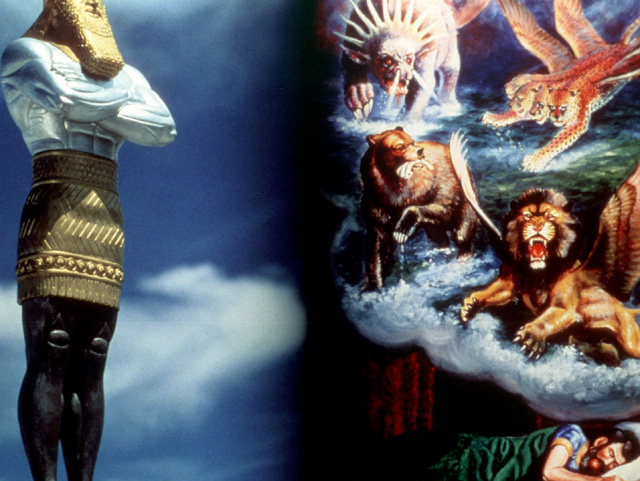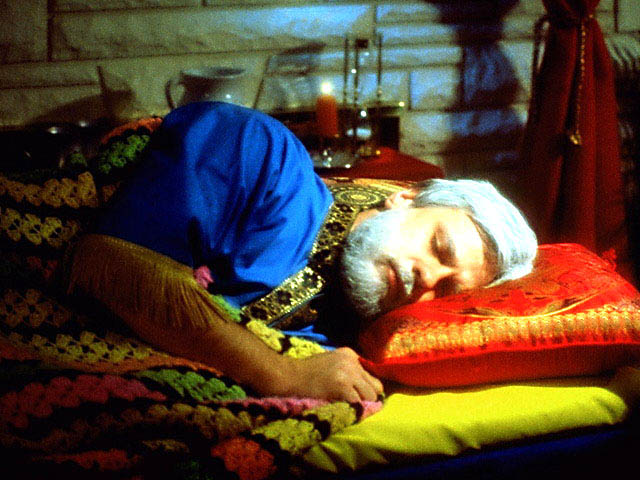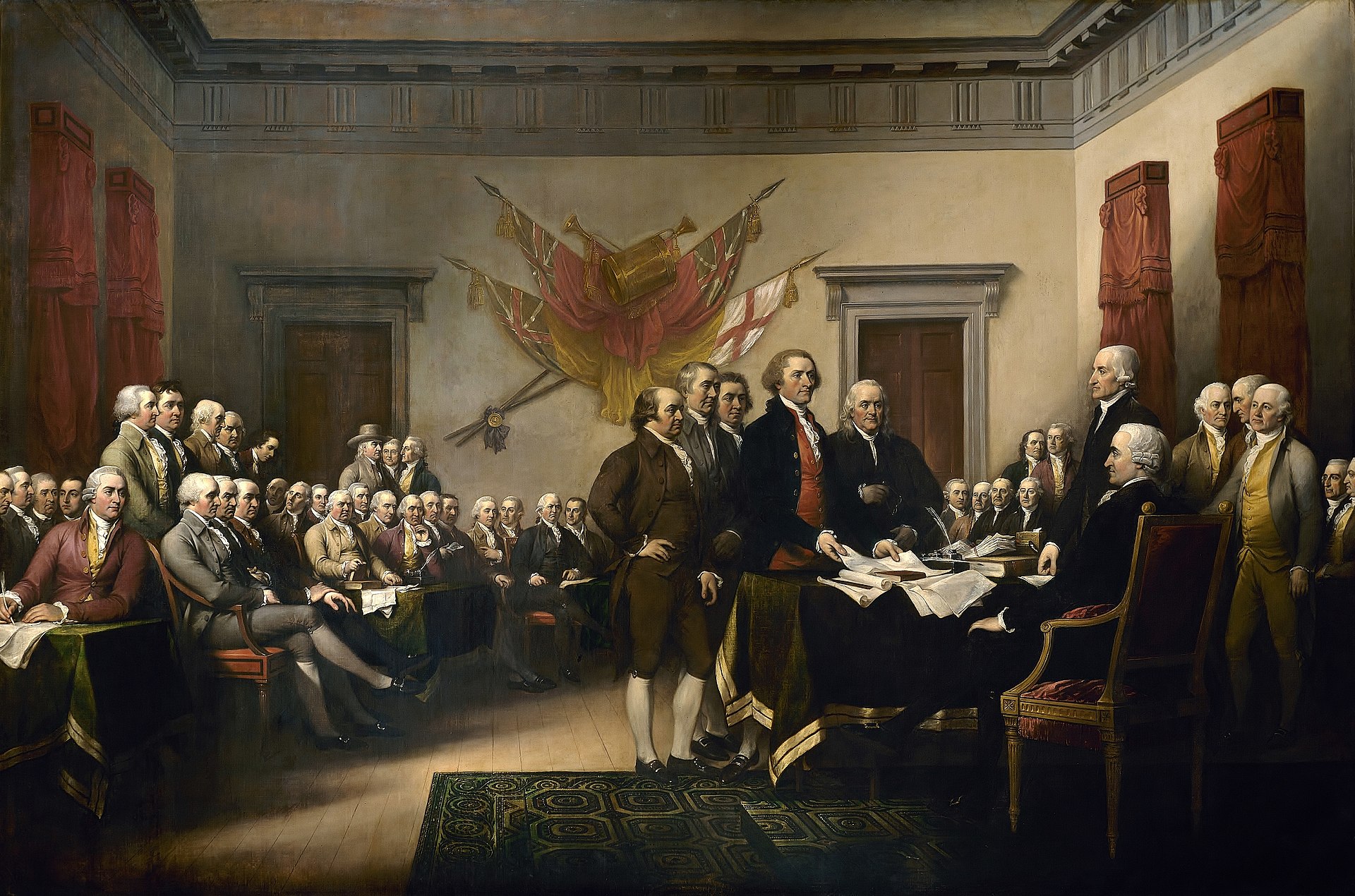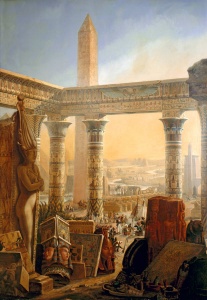“VERSE 1. In the first year of Belshazzar king of Babylon Daniel had a dream and visions of his head upon his bed; then he wrote the dream, and told the sum of the matters.”
This is the same Belshazzar mentioned in chapter 5. Chronologically, therefore, this chapter precedes chapter 5; but chronological order has been disregarded in order that the historical part of the book might stand by itself, and the prophetic part, on which we now enter, might not be interrupted by writings of that nature.
“VERSE 2. Daniel spake and said, I saw in my vision by night, and, behold, the four winds of the heaven strove upon the great sea. 3. And four great beasts came up from the sea, diverse one from another.”

All Scripture language is to be taken
“VERSE 4. The first was like a lion, and had eagle’s wings; I beheld till the wings thereof were plucked, and it was lifted up from the
earth, and made stand upon the feet as a man, and a man’s heart was given to it.”

As these beasts denote four kings, or kingdoms, we inquire, What four? Where shall we commence to enumerate? These beasts do not rise all at once, but consecutively, as they are spoken of as first, second, etc.; and the last one is in existence when all earthly scenes are brought to an end by the final Judgment. Now, from the time of Daniel to the end of this world’s history, there were to be but four universal kingdoms, as we learn from Nebuchadnezzar’s dream of the great image in chapter 2. Daniel was still living under the same kingdom which he had declared, in his interpretation of the king’s dream, about sixty-five years before, to be the head of gold. The first beast of this vision must
“VERSE 5. And behold another beast, a second, like to a bear, and it raised up itself on one side, and it had three ribs in the mouth of it between the teeth of it; and they said thus unto it, Arise, devour much flesh.”

As in the great image of chapter 2, so in this series of
“VERSE 6. After this I beheld, and lo another, like a leopard, which had upon the back of it four wings of a fowl; the beast had also four heads; and dominion was given to it.”

The third kingdom, Grecia, is represented by this symbol. If wings upon the lion signified rapidity of conquest, they would signify the same here. The leopard itself is a swift-footed beast, but this was not sufficient to represent the career of the nation which
“VERSE 7. After this I saw in the night visions, and behold a fourth beast, dreadful and terrible, and strong exceedingly; and it had great iron teeth; it devoured and brake in pieces, and stamped the residue with the feet of it; and it was diverse from all the beasts that were before it; and it had ten horns.”

Inspiration finds no beast in nature which it can make even the basis of a symbol to represent the power here illustrated. No addition of hoofs, heads, horns, wings, scales, teeth, or nails to any beast found in nature, would answer. This power was diverse from all the others and the symbol wholly nondescript. The foundation for a volume is laid in verse 7, just quoted; but we are compelled to treat it the more briefly
“VERSE 8. I considered the horns, and, behold, there came up among them another little horn, before whom there were three of the first horns plucked up by the roots; and, behold, in this horn were eyes like the eyes of man, and a mouth speaking great things.”


Daniel considered the horns. Indications of a strange movement appeared among them. A little horn (at first little, but afterward more stout than its fellows) thrust itself up among them. It was not content quietly to find a place of its own, and fill it; it must thrust aside some of the others, and usurp their places. Three kingdoms were plucked up before it. This little horn, as we shall have occasion to notice more fully hereafter, was the papacy. The three horns plucked up before it
“VERSE 9. I beheld till the thrones were cast down, and the Ancient of days did sit, whose garment was white as snow, and the hair of his head like the pure wool; his throne was like the fiery flame, and his wheels as burning fire. 10. A fiery stream issued and came forth from before him; thousand
thousands ministered unto him, and ten thousand times ten thousand stood before him; the judgment was set, and the books were opened.”
A sublimer description of a sublimer scene is not to be found in the English language. But not only on account of the grand and lofty imagery introduced should it arrest our attention; the nature of the scene itself is such as to demand most serious consideration. The Judgment is brought to view; and whenever the Judgment is mentioned, it ought to take an irresistible hold upon every mind; for all have an interest in its eternal issues. By an unfortunate translation in verse 9, a wrong idea is almost sure to be conveyed. the words cast down are from a word which in the original signifies just the opposite, namely, to set up. The word …. [r
he says, “And I beheld, and I heard the voice of many angels round about the throne, and the beasts, and the elders; and the number of them was ten thousand times ten thousand, and thousands of thousands.” It will appear from the testimony of chapter 8:14, that this solemn work is even now transpiring in the sanctuary above.
“VERSE 11. I beheld then because of the voice of the great words which the horn spake; I beheld even till the beast was slain, and his body destroyed, and given to the burning flame. 12. As concerning the rest of the beasts, they had their dominion taken away; yet their lives were prolonged for a season and time.”
There are persons who believe in a thousand years’ triumph of the gospel and reign of righteousness over all the world before the Lord comes
1. The fourth terrible beast continues without
2. The life of the fourth beast is not prolonged after its dominion is gone, as were the lives of the preceding beasts. Their dominion was taken away, but their lives were prolonged for a season. The territory and subjects of the Babylonian kingdom still existed, though made subject to the Persians. So of the Persian kingdom in respect to Grecia, and of Grecia in respect to Rome. But what succeeds the fourth kingdom? No government or state in which mortals have any part. Its career ends in the lake of fire, and it has no existence beyond. The lion was merged into the bear; the bear into the leopard; the leopard into the fourth beast; and the fourth beast into what? Not into another beast; but it is cast into the lake of fire, under which destruction it rests till men shall suffer the second death. Then let no one talk of probation or a mixed millennium after the Lord comes. The adverb then, in the sentence, “I beheld then because of the voice of the great words which the horn spake,” etc., seems to refer to some particular time. The work of the investigative judgment is introduced in the previous verses; and this verse would seem to imply that while this work is going forward, and just before this power is destroyed and given to the burning flame, the little horn utters its great words against the
“VERSE 13. I saw in the night visions, and, behold, one like the Son of man came with the clouds of
heaven, and came to the Ancient of days, and they brought him near before him. 14. And there was given him dominion, and glory, and a kingdom, that all people, nationsand languages should serve him: his dominion is an everlasting dominion, which shall not pass away, and his kingdom that which shall not be destroyed.”
The scene here described is not the second advent of Christ to this earth, unless the Ancient of days is on this earth; for it is
“VERSE 15. Daniel was grieved in my spirit in the midst of my body, and the visions of my head troubled me. 16. I came near unto one of them that stood by, and asked him the truth of all this. So he told me, and made me know the interpretation of the things. 17. These great beasts, which are four, are four kings which shall arise out of the earth. 18. But the saints of the Most High shall take the kingdom, and possess the kingdom forever, and even forever and ever.”
No less anxious should we be than was Daniel to understand the truth of all this. And whenever we inquire with equal sincerity of heart, we shall find the Lord no less ready now than in the days of the prophet to lead to a correct knowledge of these important truths. The beasts, and the kingdoms which they
“VERSE 19. Then I would know the truth of the fourth beast, which was diverse from all the others, exceeding dreadful, whose teeth were of iron, and his nails of brass; which devoured, brake in pieces, and stamped the residue with his feet; 20. And of the ten horns that were in his head, and of the other which came up, and before whom three fell; even of that horn that had eyes, and a mouth that spake very great things, whose look was more stout than his fellows.”
Of the first three beasts of this series, Daniel had so clear an understanding that he had no trouble in reference to them. But he was astonished at this fourth beast, so unnatural and dreadful; for the
“VERSE 21. I beheld, and the same horn made war with the saints, and prevailed against them; 22. Until the Ancient of days came, and judgment was given to the saints of the Most High; and the time came that the saints possessed the kingdom.”
The wonderful wrath of this little horn against the saints particularly attracted the attention of Daniel. The rise of the ten horns, or the division of Rome into ten kingdoms, between the years A.D.351 and 476, has already been noticed. (See on chapter 2:41.) As these horns denote kingdoms, the little horn must denote a kingdom also, but not of the same nature, because it was
will have been wiped away, and the territory so long misruled by the wicked powers of earth, the enemies of God’s people, will be taken by the righteous, to be held by them forever and ever. 1Cor.6:2,3; Matt.25:34.
“VERSE 23. Thus he said, The fourth beast shall be the fourth kingdom upon earth, which shall be diverse from all kingdoms, and shall devour the whole earth, and shall tread it down, and break it in pieces. 24. And the ten horns out of this kingdom are ten kings that shall arise; and another shall rise after them; and he shall be diverse from the first, and he shall subdue three kings. 25. And he shall speak great words against the Most High, and shall wear out the saints of the Most High, and think to change times and laws: and they shall be given into his hand until a time and times and the dividing of time. 26. But the judgment shall sit, and they shall take away his dominion, to consume and to destroy it unto the end.”
We have here further particulars respecting the fourth beast and the little horn. Perhaps enough has already been said respecting the fourth beast (Rome) and the ten horns, or ten kingdoms, which arose therefrom. The little horn now more particularly demands attention. As stated on verse 8, we find the fulfilment of the prophecy concerning this horn in the rise and work of the papacy. It is a matter of both interest and importance, therefore, to inquire into the causes which resulted in the development of this antichristian power. The first pastors or bishops of Rome enjoyed a respect proportionate to the rank of the city in which they resided; and for the first few centuries of the Christian era, Rome was the largest, richest, and most powerful city in the world. It was the seat of empire, the capital of the nations. “All the inhabitants of the earth belong to her,” said Julian; and Claudian declared her to be “the fountain of laws.” “If Rome is the queen of cities, why should not her pastor be the king of bishops?” was the reasoning these Roman pastors adopted. “Why should not the Roman Church be the mother of Christendom? Why should not all nations be her children, and her authority their sovereign law? It was easy,” says D’Aubigne, from whom we quote these words (“History of the Reformation,” Vol.I, chap.1), “for the ambitious heart of man to reason thus. Ambitious Rome did so.”
The bishops in the different parts of the Roman empire felt a pleasure in yielding to the bishop of Rome some portion of that honor which Rome, as the queen city, received from the nations of the earth. There was originally no dependence implied in the honor thus paid. “But,” continues D’Aubigne, “usurped power increased like an avalanche. Admonitions, at first simply fraternal, soon became absolute commands in the mouth of the pontiff. The Western bishops favored this encroachment of the Roman pastors, either from jealousy of the Eastern bishops, or because they preferred submitting to the supremacy of a pope rather than to the dominion of a temporal power.” Such were the influences clustering around the bishop of Rome, and thus was everything tending toward his speedy elevation to the supreme spiritual throne of Christendom. But the fourth century was destined to witness an obstacle thrown across the path of this ambitious dream. Arius, parish priest of the ancient and influential church of Alexandria, sprung his doctrine upon the world, occasioning so fierce a controversy in the Christian church that a general council was called at Nicaea, by the emperor Constantine, A.D.325, to consider and adjust it. Arius maintained “that the Son was totally and essentially distinct from the Father; that he was the first and noblest of those beings whom the Father had created out of nothing, the instrument by whose subordinate operation the Almighty Father formed the universe, and therefore inferior to the Father both in nature and dignity.” This opinion was condemned by the council, which decreed that Christ was of one and the same substance with the Father. Hereupon Arius was banished to Illyria, and his followers were compelled to give their assent to the creed composed on that occasion. (Mosheim, cent.4, part 2, chap.4: Stanley, History of the Eastern Church, p.239.) The controversy itself, however, was not to be disposed of in this summary manner, but continued for ages to agitate the Christian world, the Arians everywhere becoming the bitter enemies of the pope and of the Roman Catholic Church. From these facts it is evident that the spread of Arianism would check the influence of the Catholics; and the possession of Rome and Italy by a people of the Arian persuasion, would be fatal to the supremacy of a Catholic bishop.
But the prophecy had declared that this horn would rise to supreme power, and that in reaching this position it would subdue three kings. Some difference of opinion has existed in regard to the particular powers which were overthrown in the interest of the papacy, in reference to which the following remark by Albert Barnes seems very pertinent: “In the confusion that existed on the breaking up of the Roman empire, and the imperfect accounts of the transactions which occurred in the rise of the papal power, it would not be wonderful if it should be difficult to find events distinctly recorded that would be in all respects an accurate and absolute fulfilment of the vision. Yet it is possible to make out the fulfilment of this with a good degree of certainty in the history of the papacy.” -Notes on Daniel 7. Mr Mede supposes the three kingdoms plucked up to have been the Greeks, the Lombards, the Franks; and Sir Isaac Newton supposes they were the Exarchate of Ravenna, the Lombards, the Senate and Dukedom of Rome. Bishop Newton (Dissertation on the Prophecies, pp.217,218) states some serious objections to both these schemes. The Franks could not have been one of these kingdoms; for they were never plucked up before the papacy. The Lombards could not have been one; for they were never made subject to the popes. Says Barnes, ” I do not find, indeed, that the kingdom of the Lombards was, as is commonly stated, among the number of the temporal sovereignties that became subject to the authority of the popes.” And the Senate and Dukedom of Rome could not have been one; for they, as such, never constituted one of the ten kingdoms, three of which were to be plucked up before the little horn. But we apprehend that the chief difficulty in the application made by these eminent commentators, lay in the fact that they supposed that the prophecy respecting the exaltation of the papacy had not been fulfilled, and could not have been, till the pope became a temporal prince; and hence they sought
to find an accomplishment of the prophecy in the events which led to the pope’s temporal sovereignty. Whereas, evidently, the prophecy of verses 24,25 refers, not to his civil power, but to his power to domineer over the minds and consciences of men; and the pope reached this position, as will hereafter appear, in A.D. 538; and the plucking up of the three horns took place before this, and to make way for this very exaltation to spiritual dominion. The insuperable difficulty in the way of all attempts to apply the prophecy to the Lombards and the other powers named above is that they come altogether too late in point of time; for the prophecy deals with the arrogant efforts of the Roman pontiff to gain power, not with his endeavors to oppress and humble the nations after he had secured the supremacy. The position is here confidently taken that the three powers, or horns, plucked up before the papacy, were the Heruli, the Vandals, and the Ostrogoths; and this position rests upon the following statements of historians. Odoacer, the leader of the Heruli, was the first of the barbarians who reigned over the Romans. He took the throne of Italy, according to Gibbon (Decline and Fall of the Roman Empire, Vol.III, pp.510,515), in 476. Of his religious belief Gibbon (p.516) says: “Like the rest of the barbarians, he had been instructed in the Arian heresy; but he revered the monastic and episcopal characters, and the silence of the Catholics attests the toleration which they enjoyed.” Again he says (p.547): “The Ostrogoths, the Burgundians, the Suevi, and the Vandals, who had listened to the eloquence of the Latin clergy, preferred the more intelligible lessons of their domestic teachers; and Arianism was adopted as the national
faith of the warlike converts who were seated on the ruins of the Western empire. This irreconcilable difference of religion was a perpetual source of jealousy and hatred; and the reproach of barbarian was embittered by the more odious epithet of heretic. The heroes of the North, who had submitted, with some reluctance, to believe that all their ancestors were in hell, were astonished and exasperated to learn
that they themselves had only changed the mode of their eternal condemnation.” The reader is requested to consider carefully a few more historical statements which throw some light on the situation at this time. Stanley (History of the Eastern Church, p. 151) says: “The whole of the vast Gothic population which descended on the Roman empire, so far as it was Christian at all, held to the faith of the Alexandrian heretic. Our first Teutonic version of the Scriptures was by an Arian missionary, Ulfilas. The first conqueror of Rome, Alaric, and the first conqueror of Africa, Genseric, were Arians. Theodoric, the great king of Italy, and hero of the ‘Nibelungen Lied,’ was an Arian. The vacant place in his massive tomb at Ravenna is a witness of the vengeance which the Orthodox took on his memory, when, in their triumph, they tore down the porphyry vase in which his Arian subjects had enshrined his ashes.” Ranke, in his History of the Popes (London, edition of 1871), Vol.I, p.9, says: “But she [the church] fell, as was inevitable, into many embarrassments, and found herself in an entirely altered condition. A pagan people took possession of Britain; Arian kings seized the greater part of the remaining West; while the Lombards, long attached to Arianism, and as neighbors most dangerous and hostile, established a powerful sovereignty before the very gates of Rome. The Roman bishops, meanwhile, beset on all sides, exerted themselves with all the prudence and pertinacity which have remained their peculiar attributes, to regain the mastery, at least in the patriarchal diocese.” Machiavelli, in his History of Florence, p. 14, says: “Nearly all the wars which the northern barbarians carried on in Italy, it may be here remarked, were occasioned by the pontiffs; and the hordes with which the country was inundated, were generally called in by them.” These extracts give us a general view of the state of affairs at this time, and show us that though the hands of the Roman pontiffs might not be visibly manifest in the movements upon the political board, they constituted the power working assiduously behind the scenes to secure their own purposes. The
relation which these Arian kings sustained to the pope, from which we can see the necessity of their being overthrown to make way for papal supremacy, is shown in the following testimony from Mosheim, given in his History of the Church, cent.6, part 2, chap.2, sec.2:- “On the other hand, it is certain, from a variety of the most authentic records, that both the emperors and the nations in general were far from being disposed to bear with patience the yoke of servitude which the popes were imposing upon the Christian church. The Gothic princes set bounds to the power of these arrogant prelates in Italy, permitted none to be raised to the pontificate without their approbation, and reserved to themselves the right of judging of the legality of every new election.” An instance in proof of this statement occurs in the history of Odoacer, the first Arian king above mentioned, as related by Bower in his History of the Popes, Vol.I, p.271. When, on the death of Pope Simplicius, A.D.483, the clergy and people had assembled for the election of a new pope, suddenly Basilius, lieutenant of King Odoacer, appeared in the assembly, expressed his surprise that any such work as appointing a successor to the deceased pope should be undertaken without him, in the name of the king declared all that had been done null and void, and ordered the election to be begun anew. Certainly the horn which exercised such a restrictive power over the papal pontiff must be taken away before the pope could reach the predicted supremacy. Meanwhile, Zeno, the emperor of the East, and friend of the pope, was anxious to drive Odoacer out of Italy (Machiavelli, p.6), a movement which he soon had the satisfaction of seeing accomplished without trouble to himself, in the following manner. Theodoric had come to the throne of the Ostrogothic kingdom in Moesia and Pannonia. Being on friendly terms with Zeno, he wrote him, stating that it was impossible for him to restrain his Goths within the impoverished province of Pannonia, and asking his permission to lead them to some more favorable region, which they might conquer and possess. Zeno gave him permission to march against Odoacer, and take
possession of Italy. Accordingly, after a three years’ war, the Herulian kingdom in Italy was overthrown, Odoacer was treacherously slain, and Theodoric established his Ostrogoths in the Italian peninsula. As already stated, he was an Arian, and the law of Odoacer subjecting the election of the pope to the approval of the king, was still retained. The following incident will show how completely the papacy was in subjection to his power. The Catholics in the East, having commenced a persecution against the Arians in 523, Theodoric summoned Pope John into his presence, and thus addressed him: “If the emperor [Justin, the predecessor of Justinian] does not think fit to revoke the edict which he has lately issued against those of my persuasion [that is, the Arians], it is my firm resolution to issue the like edict against those of his [that is, the Catholics]; and to see it everywhere executed with the same rigor. Those who do not profess the faith of Nicaea are heretics to him, and those who do are heretics to me. Whatever can excuse or justify his severity to the former, will excuse the justify mine to the latter. But the emperor,” continued the king, “has none about him who dare freely and openly speak what they think, or to whom he would hearken if they did. But the great veneration which he professes for your See, leaves no room to doubt but he would hearken to you. I will therefore have you to repair forthwith to Constantinople, and there to remonstrate, both in my name and your own, against the violent measures in which that court has so rashly engaged. It is in your power to divert the emperor from them; and till you have, nay, till the Catholics [this name Theodoric applies to the Arians] are restored to the free exercise of their religion, and to all the churches from which they have been driven, you must not think of returning to Italy.” – Bower’s History of the Popes, Vol.I, p.325. The pope who was thus peremptorily ordered not to set his foot again upon Italian soil until he had carried out the will of the king, certainly could not hope for much advancement toward any kind of supremacy till that power was taken out of the way. Baronius, according to Bower, will have it that the pope sacrificed himself on this occasion, and advised the
emperor not by any means to comply with the demand the king had sent him. But Mr. Bower thinks this inconsistent, since he could not, he says, “sacrifice himself without sacrificing, at the same time, the far greater part of the innocent Catholics in the West, who were either subject to King Theodoric, or to other Arian princes in alliance with him.” It is certain that the pope and the other ambassadors were treated with severity on their return,which Bower explains on this wise: “Others arraign them all of high treason; and truly the chief men of Rome were suspected at this very time of carrying on a treasonable correspondence with the court of Constantinople, and machinating the ruin of the Gothic empire in Italy.” – Id.,p.326. The feelings of the papal party toward Theodoric may be accurately estimated, according to a quotation already given, by the vengeance which they took on his memory, when they tore from his massive tomb in Ravenna the porphyry vase in which his Arian subjects had enshrined his ashes. But these feelings are put into language by Baronius, who inveighs “against Theodoric as a cruel barbarian, as a barbarous tyrant, as an impious Arian.” But “having exaggerated with all his eloquence, and bewailed the deplorable condition of the Roman Church reduced by that heretic to a state of slavery, he comforts himself in the end, and dries up his tears, with the pious thought that the author of such a calamity died soon after, and was eternally damned!” – Bower, Vol.I, p.328; Compare Baronius’ Annals, A.D.526, p.116. While the Catholics were thus feeling the restraining power of an Arian king in Italy, they were suffering a violent persecution from the Arian Vandals in Africa. (Gibbon, chap.,37, sec.2.) Elliott, in his Horae Apocalypticae, Vol.III, p.152, note 3, says: “The Vandal kings were not only Arians, but persecutors of the Catholics: in Sardinia and Corsica, under the Roman Episcopate, we may presume, as well as in Africa.” Such was the position of affairs, when, in 533, Justinian entered upon his Vandal and Gothic wars. Wishing to secure the influence of the pope and the Catholic party, he issued that memorable decree which was to constitute the pope the head of all the churches, and from the carrying out of which, in 538, the period of papal supremacy is to be dated. And whoever will read the history of the African campaign, 533-534, and the Italian campaign, 534-538, will notice that the Catholics everywhere hailed as deliverers the army of Belisarius, the general of Justinian. The testimony of D’Aubigne (Reformation, book 1, chap.1) also throws light upon the undercurrents which gave shape to outward movements in these eventful times. He says: “Princes whom these stormy times often shook upon their thrones, offered their protection if Rome would in its turn support them. They conceded to her the spiritual authority, provided she would make a return in secular power. They were lavish of the souls of men, in the hope that she would aid them against their enemies. The power of the hierarchy, which was ascending, and the imperial power, which was declining, leaned thus one upon the other, and by this alliance accelerated their twofold destiny. Rome could not lose by it. An edict of Theodosius II and of Valerian III proclaimed the Roman bishop ‘rector of the whole church.’ Justinian published a similar decree.” But no decree of this nature could be carried into effect until the Arian horns which stood in its way were overthrown. The Vandals fell before the victorious arms of Belisarius in 534; and the Goths received a crushing blow in connection with their unsuccessful siege of Rome in 538. (Gibbon, chap.41.) Procopius relates that the African war was undertaken by Justinian for the relief of the Christians (Catholics) in that quarter; and that when he expressed his intention in this respect, the prefect of the palace came very near dissuading him from his purpose; but a dream appeared to him in which he was bidden “not to shrink from the execution of his design; for by assisting the Christians he would overthrow the power of the Vandals.” – Evagrius’ Eccl.Hist., book 4, chap.16. Listen again to Mosheim: “It is true that the Greeks who had received the decrees of the Council of Nicaea [that is, the Catholics], persecuted and oppressed the Arians wherever their
influence and authority could reach; but the Nicenians, in their turn, were not less rigorously treated by their adversaries [the Arians], particularly in Africa and Italy, where they felt, in a very severe manner, the weight of the Arian power, and the bitterness of hostile resentment. The triumphs of Arianism were, however, transitory, and its prosperous days were entirely eclipsed when the Vandals were driven out of Africa, and the Goths out of Italy, by the arms of Justinian.” – Mosheim’s Church History, cent.6, part 2, chap.5, sec.3. Elliot, in his Horae Apocalypticae, makes two enumerations of the ten kingdoms which rose out of the Roman empire, varying the second list from the first according to the changes which had taken place at the later period to which the second list applies. His first list differs from that mentioned in remarks on chap.2:42, only in that he put the Alemanni in place of the Huns, and the Bavarians in place of the Lombards, a variation which can be easily accounted for. But out of this list he names the three that were plucked up before the papacy in these words: “I might cite three that were eradicated from before the pope out of the list first given; namely, the Heruli under Odoacer, the Vandals, and the Ostrogoths.” – Vol.III, p.152, note 1. Although he prefers the second list, in which he puts the Lombards instead of the Heruli, the foregoing is good testimony that if we make the enumeration of the ten kingdoms while the Heruli were a ruling power, they were one of the horns which were plucked up. From the historical testimony above cited, we think it clearly established that the three horns plucked up were the powers named; viz., the Heruli in A.D.493, the Vandals in 534, and the Ostrogoths in 553. The effective opposition of the Ostrogoths to the decree of Justinian, however, it is to be noted, ceased when they were driven from Rome by Belisarius in 538. 1. “He shall speak great words against the Most High.” Has the papacy done this? Look at such self-approved titles of the pope as “Vicegerent of the Son of God,” and “Lord God, the Pope.” – See gloss on the Extravagantes of Pope John
XXII, title 14, ch.4, “Declaramus.” Said Pope Nicholas to Emperor Michael, “The pope can never be bound or loosed by the secular power, since it is plain that he was called God by the pious prince Constantine; . . . and it is manifest that God can not be judged by man.” – Decreti Prima Pars. Distinctio XCVI, Caput 8. Is there need of bolder blasphemy than this? Note also the adulation the popes have received from their followers without rebuke. Lord Anthony Pucci, in the fifth Lateran, said to the pope, “The sight of thy divine majesty does not a little terrify me; for I am not ignorant that all power both in heaven and in earth is given unto you; that the prophetic saying is fulfilled in you, ‘All the kings of the earth shall worship him, and nations shall serve him.'” (See Oswald’s Kingdom Which Shall Not Be Destroyed, pp.97-99.) Again, Dr. Clarke, on verse 25, says: “‘He shall speak as if he were God.’ So St. Jerome quotes from Symmachus. To none can this apply so well or so fully as to the popes of Rome. They have assumed infallibility, which belongs only to God. They profess to forgive sins, which belongs only to God. They profess to open and shut heaven, which belongs only to God. They profess to be higher than all the kings of the earth, which belongs only to God. And they go beyond God in pretending to loose whole nations from their oath of allegiance to their kings, when such kings do not please them. And they go against God when they give indulgences for sin. This is the worst of all blasphemies.”
2. “And shall wear out the saints of the Most High.” Has the papacy done this? For the mere information of any student of church history, no answer need here be given. All know that for long years the papal church has pursued its relentless work against the true followers of God. Chapter after chapter might be given, would our limited space permit. Wars, crusades, massacres, inquisitions, and persecutions of all kinds, – these were their weapons of extinction. Scott’s Church History says: “No computation can reach the numbers who have been put to death, in different ways, on account of their maintaining the profession of the gospel, and opposing the corruptions of the Church of Rome. A million
describe its history.” (See Buck’s Theological Dictionary, art., Persecutions: Oswald’s Kingdom, etc., pp.107-133; Dowling’s History of Romanism; Fox’s Book of Martyrs: Charlotte Elizabeth’s Martyrology; The Wars of the Huguenots; The Great Red Dragon, by Anthony Gavin, formerly one of the Roman Catholic priests of Saragossa, Spain; Histories of the Reformation, etc.) To parry the force of this damaging testimony from all history, papists deny that the church has ever persecuted
of Luther; for as almost an infinite number were either burned or otherwise put to death, Luther either did not know it, and was therefore ignorant; or if he knew it, he was convicted of impudence and falsehood; for that heretics were often burned by the church,
Not human laws of any kind; for the little horn had
midst of symbolic prophecy; hence in this measurement the time is not literal, but symbolic also. The inquiry then arises, How long a period is denoted by the three years and a half of prophetic time? The rule given us in the Bible is, that when a day is used as a symbol, it stands for a year. Eze.4:6; Num.14:34. Under the Hebrew word for
(Chapter taken from the book Thoughts on Daniel and Revelation by U.Smith)





































